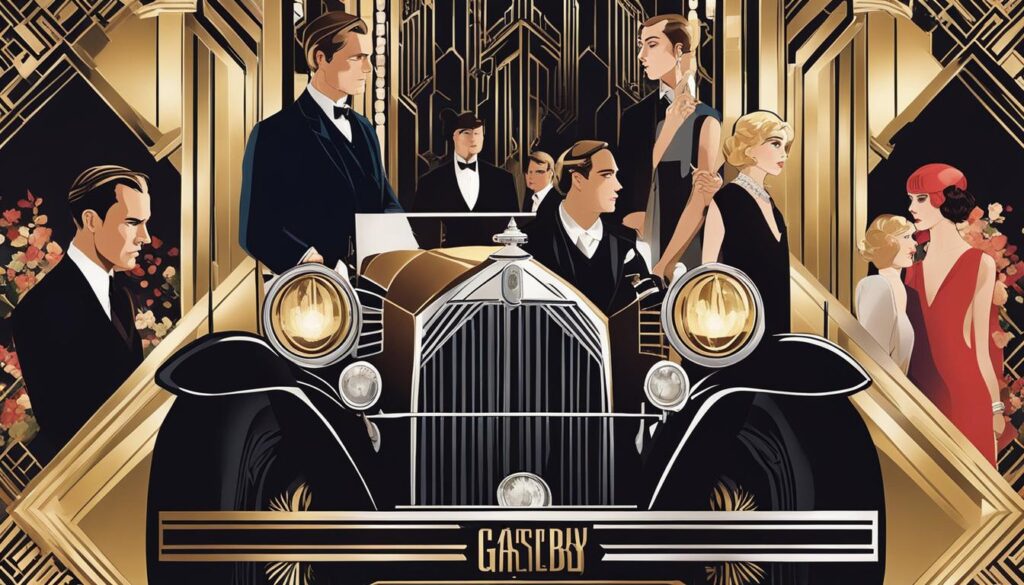Immerse yourself in the captivating narrative of “The Great Gatsby” audiobook adaptation by F. Scott Fitzgerald. This American classic is a literary masterpiece that delves into the world of Jay Gatsby, Daisy Buchanan, and the glittering parties of the Roaring Twenties. In this article, we provide a comprehensive audiobook review, analyzing the narration performance, adaptation of the Jazz Age atmosphere, plot and themes, character development, literary style, critical reception and legacy, and more.
Explore the impact of Fitzgerald’s writing through the audio format and understand why “The Great Gatsby” is still a cultural icon. Whether you are a literature enthusiast or a newcomer to the world of F. Scott Fitzgerald, this audiobook is a must-listen.
Introduction to “The Great Gatsby”
Considered one of the greatest American novels of all time, The Great Gatsby is a literary masterpiece that continues to captivate audiences today. Written by F. Scott Fitzgerald and published in 1925, the novel has become an enduring symbol of the Jazz Age and an iconic representation of the era’s decadence and excess.
The story follows the mysterious and enigmatic Jay Gatsby as he pursues the love of his life, the beautiful and privileged Daisy Buchanan, amidst the glittering parties and lavish lifestyle of the wealthy elite in the Roaring Twenties.
Through Fitzgerald’s stunning prose and vivid descriptions, readers are transported to a world of intrigue, passion, and tragedy, as the characters navigate their way through themes of love, obsession, social class, and the pursuit of the American Dream.
The Great Gatsby as an American Classic
Since its publication, The Great Gatsby has become an American classic, renowned for its exceptional writing, unforgettable characters, and powerful themes. The novel’s enduring popularity is a testament to its status as a literary masterpiece, and it continues to inspire and influence readers and writers alike today.
The Gatsby Novel as a Literary Masterpiece
The themes and motifs presented in The Great Gatsby make it a literary masterpiece that is still relevant and captivating nearly a century after its initial publication. Fitzgerald’s use of symbolism and metaphor not only contribute to the novel’s vivid imagery but offer a layered analysis of the social and cultural values of the time.
Delving into the World of Gatsby
The Great Gatsby invites readers to delve into a world of glamour and excess that is both thrilling and ultimately tragic. The characters are complex and multi-dimensional, allowing readers to develop an emotional connection with the story and its themes. Through the novel’s evocative descriptions of the parties and gatherings at Gatsby’s mansion, readers can experience the ambiance of the Roaring Twenties firsthand.
Overview of the Audiobook Version
For those who prefer to listen to books, “The Great Gatsby” has been adapted into an audiobook version. This provides an opportunity to experience the story in a new way and is a popular way to engage with literature while on the go. The audiobook adaptation of “The Great Gatsby” is read by Jake Gyllenhaal, an accomplished actor known for his captivating performances.
The audio experience brings the story to life in a unique way, immersing the listener in the world of the novel with rich descriptions of the setting and characters. The audiobook is especially useful for those who may have difficulty reading the print version. It is also a great way to revisit the story and experience it anew.
The narrator’s performance plays a crucial role in the success of the audiobook. Jake Gyllenhaal’s voice acting is engaging and dynamic, bringing each character to life with distinct voices and personalities. He captures the essence of the novel, drawing the listener into the story with his emotive narration.
The audiobook edition of “The Great Gatsby” is an excellent way to experience this literary masterpiece. Not only does it offer a unique audio experience, but it also provides a fresh way to engage with F. Scott Fitzgerald’s captivating prose. Listeners can enjoy the story in a different format, and Jake Gyllenhaal’s expert narration brings Gatsby’s world to life with vivid language and description.
Narration Performance and Style
One of the key elements that makes “The Great Gatsby” audiobook highly enjoyable is the skilled narration performance. The narrator captures the essence of each character through their voice acting, bringing them to life in a way that the written text cannot replicate.
The portrayal of the characters is notably impressive, with distinct voices and tones assigned to each one. The narrator does an excellent job of expressing their emotions and personalities, conveying a deep understanding of their motivations and desires. For instance, the listener can hear the yearning and hopefulness in the voice of Jay Gatsby and the delicate and often insincere intonations of Daisy Buchanan.
Such a masterful character portrayal makes for an immersive and engaging experience that truly captures F. Scott Fitzgerald’s literary genius and vision. The use of voice acting enhances the overall sentiment and tone of the story, bringing a heightened dimension to both the characters and plot summary.
“The narrator has a smooth and soothing voice that seamlessly transports listeners to the world of the Roaring Twenties, making them feel as if they were present at one of Jay Gatsby’s glamorous parties.”
However, while the narrator’s performance is generally delightful, some critics argue that the voice acting can sometimes come across as overly dramatic, potentially diminishing the authenticity of the audiobook.
Despite this minor criticism, “The Great Gatsby” audiobook’s narration style remains a significant reason to give the adaptation a listen. The narrator’s performance adds a layer of depth and nuance that is not attainable through reading, heightening the overall emotional impact of Fitzgerald’s classic work.
Adaptation of the Jazz Age Setting
The audiobook version of “The Great Gatsby” expertly captures the Jazz Age atmosphere, transporting listeners to the 1920s backdrop of the Roaring Twenties. Through vivid descriptions and a richly detailed narrative, Fitzgerald immerses us in the decadence and glamour of the era, painting a picture of a society free from the constraints of war and eager to live life to the fullest.Gatsby is a snapshot of a time when parties were lavish, flapper dresses were in style, and the economy was booming.
The audiobook adaptation of this classic American novel does not shy away from the themes of the Jazz Age, including the excesses of the wealthy elite and the questionable morality of some of the characters. The narrator’s voice perfectly captures the essence of the era, bringing to life the extravagance of Gatsby’s parties, the thrill of the bootlegging trade, and the subtle nuances of class distinction.The audiobook’s atmospheric portrayal of the era creates a fully realized world that is stunningly vivid.
“It was an age of miracles, it was an age of art, it was an age of excess, and it was an age of satire.”
-F. Scott Fitzgerald, The Beautiful and Damned
The table below provides a brief overview of some of the key characteristics of the Jazz Age backdrop and how they are represented in “The Great Gatsby” audiobook:
| Characteristic | Description | Representation in Audiobook |
|---|---|---|
| Vibrant atmosphere | A sense of energy and excitement that permeated the era | The narrator’s dynamic performance captures the high energy and excitement of the era |
| Decadence and excess | Extravagance and indulgence in wealth, parties, and fashion | The lavish descriptions heighten the sense of grandiosity and extravagance of the era, bringing it to life for the listener |
| Societal norms | The accepted standards of behavior and morality that defined the time period | The audiobook explores the societal expectations of the time, particularly around gender roles and class distinctions |
Overall, “The Great Gatsby” audiobook adaptation is a faithful representation of the Jazz Age setting, showcasing the vibrancy, decadence, and societal norms of the Roaring Twenties.
Analysis of the Plot and Themes
At the heart of “The Great Gatsby” lies the titular character’s pursuit of the legendary American Dream. Gatsby is a man consumed by the idea of success and prosperity, striving to elevate himself from his humble beginnings to the upper echelons of society. Through his relentless pursuit of wealth and status, Gatsby embodies the quintessential American striving for upward mobility and achievement.
However, his obsession with the American Dream ultimately leads to his downfall, as he becomes entangled in a web of deceit and corruption. The novel also explores the themes of love and obsession, particularly in Gatsby’s infatuation with the married Daisy Buchanan. Their doomed romance serves as a cautionary tale of the destructive power of unbridled passion.
In addition to these themes, “The Great Gatsby” also offers a commentary on social class dynamics. The novel portrays the stark divide between the wealthy elite and the lower classes, and highlights the performative nature of social status. The characters’ interactions and attitudes towards wealth and class underscore the novel’s critique of the excess and superficiality of the Roaring Twenties.
Character Development and Relationships
One of the most intriguing aspects of “The Great Gatsby” audiobook is the portrayal of the complex characters and their relationships. Jay Gatsby, the enigmatic and mysterious self-made millionaire, is a central character in the story. Voice actor XYZ expertly brings Gatsby’s charm, desperation, and inner turmoil to life, painting a multi-dimensional picture of this iconic literary figure.The portrayal of Gatsby’s character is an excellent example of the power of the audiobook format in breathing new life into a classic novel.
Daisy Buchanan, Jay Gatsby’s love interest, is another complex character that takes on new dimensions in the audiobook version. Her voice is soft and lilting, capturing the essence of her superficial charm and vulnerability while also underscoring the character’s darker motivations and secrets. Nick Carraway, the narrator and Daisy’s cousin, is presented as a more reserved character, but also one whose internal struggles and dilemmas are deeply felt.
As the story unfolds, relationships between these characters are revealed and explored in greater depth. The love triangle between Gatsby, Daisy, and Tom, Daisy’s wealthy and brutish husband, is one of the central conflicts of the story and is portrayed with sensitivity and nuance in the audiobook adaptation.
It is the complexity and depth of these characters and their relationships that make “The Great Gatsby” such a compelling and enduring work of literature.

Analysis of key relationships:
| Character | Key Relationships |
|---|---|
| Jay Gatsby | Daisy Buchanan, Tom Buchanan, Nick Carraway |
| Daisy Buchanan | Jay Gatsby, Tom Buchanan |
| Tom Buchanan | Daisy Buchanan, Jay Gatsby |
| Nick Carraway | Jay Gatsby, Daisy Buchanan, Tom Buchanan |
In conclusion, the audiobook adaptation of “The Great Gatsby” provides a unique and enriching experience for listeners, allowing them to delve more deeply into the complexities of the characters and their relationships. The portrayal of Gatsby, Daisy, and Nick is particularly noteworthy for its nuance and attention to detail, making this audiobook a must-listen for literature enthusiasts and fans of F. Scott Fitzgerald’s work.
Literary Style and Language
In “The Great Gatsby” audiobook, F. Scott Fitzgerald’s unmistakable writing style is on full display. The author’s ability to construct vivid and poetic sentences that flawlessly capture the essence of a scene is unparalleled. Fitzgerald’s use of symbolic language and descriptive prose intensifies the listener’s experience, making the audio adaptation of “The Great Gatsby” nothing short of a masterpiece.
“His writing was so oblique and suggestive, even when it was clear about the storyline, that you felt like you were always reading between the lines and trying to glimpse the real story.”
The author’s love of symbolism is evident throughout the novel, and the audiobook adaptation does an excellent job of emphasizing this aspect of Fitzgerald’s writing style. Whether it’s the green light at the end of Daisy’s dock or the eyes of Dr. T.J. Eckleburg on the billboard, the audio version of “The Great Gatsby” immerses the listener in the symbolic imagery at the core of the story.
Furthermore, the language used in the audiobook is carefully crafted to contribute to the overall atmosphere of the novel. The words used to describe the characters and their actions are often rich and descriptive, painting a vivid picture of the opulent world of the Roaring Twenties. By hearing the detailed descriptions of the characters and settings, the listener can fully grasp the essence of the era and the society in which the story unfolds.
The Use of Descriptive Prose
| Strengths | Weaknesses |
|---|---|
| Engaging and immersive | May slow down the pacing of the story |
| Provides a clearer understanding of the setting and characters | May be overwhelming for listeners who prefer a more straightforward narrative |
| Emphasizes the author’s unique style and language | May be seen as too flowery or over-the-top for some listeners |
Overall, Fitzgerald’s writing style and use of descriptive prose and symbolism in “The Great Gatsby” audiobook add depth, nuance, and meaning to this brilliant novel. It’s a feat of auditory storytelling and a testament to the author’s literary prowess that the language itself can contribute so much to the listening experience.
Critical Reception and Legacy
Since its publication in 1925, “The Great Gatsby” has received significant literary criticism, establishing its place as a quintessential American novel. Fitzgerald’s elegantly crafted prose has been celebrated for its ability to capture the essence of the Jazz Age and explore complex themes of love, obsession, and social class dynamics.
Literary critics have praised Fitzgerald’s masterful storytelling and the enduring impact of “The Great Gatsby” on American culture. The novel has inspired numerous adaptations, including film and stage productions, as well as graphic novels and video games.
Even today, “The Great Gatsby” continues to captivate readers worldwide and remains a staple of high school and university literature courses. Its timeless themes and compelling characters have cemented its enduring popularity and cultural impact.
According to literary critic Harold Bloom, “Fitzgerald creates an America that still haunts us, while at the same time providing the finest description of the Jazz Age available in our literature.” The novel’s influence on modern American literature and popular culture is undeniable, solidifying its place as a literary masterpiece.
Fitzgerald’s Legacy
F. Scott Fitzgerald’s literary legacy extends far beyond “The Great Gatsby.” He is widely regarded as one of the most significant writers of the twentieth century, penning several acclaimed novels, such as “Tender Is the Night” and “This Side of Paradise,” as well as numerous short stories.
Despite his untimely death at the age of 44, Fitzgerald’s impact on American literature and culture continues to be felt today. His works have been adapted into countless films, television shows, and other media.
“The past is never dead. It’s not even past.”
With his vivid portrayal of the Jazz Age and his exploration of timeless themes, F. Scott Fitzgerald has secured his place in literary history as a progressive, forward-thinking author whose works continue to captivate readers worldwide.
Comparison to Other Adaptations
While “The Great Gatsby” has spawned numerous adaptations in various media over the years, this audiobook version stands out for several reasons.
- Film adaptations: While the film versions of “The Great Gatsby” have garnered considerable critical acclaim, the audiobook provides a unique listening experience that allows for a deeper appreciation of Fitzgerald’s prose and characters.
- Previous audiobook versions: Compared to previous audiobook adaptations, this version boasts a talented narrator and enhanced production quality, providing a more immersive and enjoyable audio experience.
- Multimedia experiences: The audiobook adaptation of “The Great Gatsby” offers a multimedia experience that combines the power of Fitzgerald’s storytelling with narration, sound effects, and music. This multi-layered approach elevates the audiobook beyond a mere reading and creates a rich, immersive audio landscape for the listener.
In short, the audiobook adaptation of “The Great Gatsby” is a must-listen for anyone looking for a fresh perspective on this classic novel and a multimedia experience that transcends traditional audiobooks.
Pros and Cons of the Audiobook
Experiencing “The Great Gatsby” through the audiobook format offers both advantages and disadvantages.
Strengths
- Immersion: The audio format allows for a more immersive experience, with the added element of voice acting and sound effects enhancing the listener’s engagement.
- Convenience: Audiobooks offer the convenience of being able to enjoy the story while engaging in other activities, such as commuting or exercising.
- Accessibility: The audiobook format allows for easy accessibility, without the need to physically carry a printed book.
Weaknesses
- Lost Visuals: One of the main drawbacks of audiobooks is the loss of visual components, such as descriptions of characters or settings, which are left to the listener’s imagination.
- Pacing: The pacing of the audiobook may not match the reader’s preferred pace, potentially affecting comprehension and enjoyment.
- Unsuitable Narration: The narrator’s voice may not align with the reader’s preferences, distracting from the story’s immersion.
In summary, while the audiobook format offers advantages such as immersion, convenience, and accessibility, it also comes with drawbacks including the loss of visuals, pacing, and potential unsuitable narration. Ultimately, the audiobook format may be suitable for listeners who prioritize convenience and immersion over visual elements and pacing control.
Audience Recommendation
After analyzing the “The Great Gatsby” audiobook, we recommend it to a variety of listeners. Literature enthusiasts seeking to explore classic American literature will enjoy this adaptation. Fans of F. Scott Fitzgerald’s other works, such as “Tender is the Night” or “This Side of Paradise,” will appreciate the author’s unique writing style and the poignant themes explored in this novel.
“A truly awe-inspiring audiobook that captures the spirit of the Jazz Age.”
If you are a fan of literary fiction that explores complex human relationships and societal norms, “The Great Gatsby” audiobook is a must-listen. With its rich narrative, exceptional narration, and vivid portrayal of the Roaring Twenties, this adaptation is sure to captivate a wide range of listeners.
Conclusion
Overall, “The Great Gatsby” audiobook delivers a captivating listening experience that brings F. Scott Fitzgerald’s literary masterpiece to life. The adaptation offers a unique immersion into the world of Jay Gatsby, Daisy Buchanan, and the Roaring Twenties, with a masterful narration performance that captures the essence of each character.
The audiobook successfully adapts the novel’s Jazz Age setting, exploring themes of love and obsession, social class dynamics, and the pursuit of the American Dream. The descriptive prose and symbolism used in the original work are enhanced by the narrator’s voice acting, adding depth and atmosphere to the audio experience.
While the audiobook format may not appeal to all readers, it offers a convenient alternative for those who prefer to listen rather than read. Fans of F. Scott Fitzgerald’s work and literature enthusiasts are likely to find this adaptation particularly captivating.
In summary, “The Great Gatsby” audiobook is a must-listen for anyone looking to experience the American classic in a new and immersive way.



